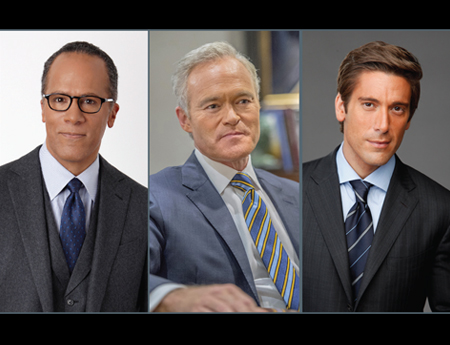Reboot of Network News Divisions Accelerating In Williams’ Absence

The smarter way to stay on top of broadcasting and cable industry. Sign up below
You are now subscribed
Your newsletter sign-up was successful
This winter's scandal of Brian Williams’ false reporting of a 2003 Iraq helicopter story, followed by his six-month suspension without pay by NBC, cast a harsh spotlight on the already diminished broadcast network newscast.
Audiences still tune in by the millions each evening, but they are aging notably as digital offerings lure younger viewers away. It is an acceleration of a trend that began back when Tom Brokaw, Peter Jennings and Dan Rather were seen as a step down from agenda-setting, medium-defining anchors such as Walter Cronkite. The current emphasis on lower-profile personalities, not globe-trotting, talk-show-couch-sitting superstars, is likely to be clearly felt during the next few Williams-free months, and probably beyond. And with the ratings race suddenly more wide open than it’s been in years, NBC and its rivals are fine-tuning their strategies in search of any advantage.
Here is a closer look at how the evening newscasts stack up heading into a period that could see a reshuffling of the ratings hierarchy.
NBC: All Eyes on Holt
If Nightly News sub Lester Holt were to get the job permanently, it would mark the official end of the superstar anchor era. Williams’ future with NBC—he isn’t scheduled to come back until August—could very well depend on how many viewers Holt is able to hold on to during his six-month guest run.
The first week with Holt in the anchor chair, NBC continued its five-plus-year winning streak among total viewers, though ABC and CBS gained a lot of ground. In the final week before Williams’ exit, NBC was ahead of second-place ABC by 8% in both total viewers and the adults 25-54 news demo, but saw that lead get cut in half in Holt’s first week (in the news demo it was just 2%).
During Holt’s second week atop Nightly News, the newscast retained its lead among total viewers for the 283rd straight week, even surpassing 10 million viewers for the week for the fourth time this season.
The smarter way to stay on top of broadcasting and cable industry. Sign up below
ABC: Putting News, Entertainment in a Blender
Without a doubt, ABC’s World News Tonight has the most to gain from Williams’ six months in the penalty box, as the newscast looks to continue ratings momentum that had been growing even before the controversy.
David Muir ascended to the anchor chair last September (along with new executive producer Almin Karamehmedovic) and has largely maintained the numbers posted by predecessor Diane Sawyer. The network’s decision to infuse the broadcast with more pop culture fare—many have credited Good Morning America’s rise to the top of the morning show mountain to the same thing—have proven a boon to World News. The show has posted year-over-year gains of 6% among total viewers and 3% in the news demo this season, the only evening newscast to be up in both measures.
The news demo is where World News had made its biggest inroads, as the newscast has jostled with NBC for that crown. While it won the November sweeps period for the first time in 18 years and led the fourth quarter of 2014, ABC fell behind NBC early this year. After narrowly losing to NBC during Holt’s first week in the chair, World News surpassed NBC in the most recent week ratings were available (Feb. 16).
More than his rival anchors, Muir is very active on social media, even tweeting during World News’ commercial breaks. ABC launched daily one-minute newscasts on Facebook called “Facecasts” in December, which get about 107,000 viewers per episode.
CBS: Playing It Straight
While NBC and ABC have seen ratings success by going with lighter news fare, CBS has gone in the complete opposite direction.
If Brian Williams is the last “star” anchor, Evening News anchor Scott Pelley is Williams’ tonal opposite. After a flurry of press around his 2011 appointment as Katie Couric’s replacement, Pelley has so far rebuffed invitations to appear on entertainment programs, films and network dramas.
Pelley’s refusal to mix entertainment and news, driven home by him remaining entrenched on 60 Minutes, is shared by the CBS News division. The network has remained stuck in third place, though CBS notes that Pelley’s broadcast has gained 1.25 million viewers since he took over for Couric.
Like ABC, CBS got a new executive producer in 2014, bringing over former NBC News president Steve Capus, who has helped CBS maintain its status as the spot for more serious reporting. One example: In his 2014 Year in Review report, media analyst Andrew Tyndall noted that CBS covered foreign news more than its rivals. Pelley was the first to broadcast from Cuba after President Obama announced that the U.S. would attempt to reestablish diplomatic relations with the country.
The challenge faced by Capus and CBS News president David Rhodes sums up the changing fortunes of all network news divisions. That is, can the network that gave the world Edward R. Murrow and put Uncle Walter behind the anchor desk manage to compete by doubling down on serious journalism?
